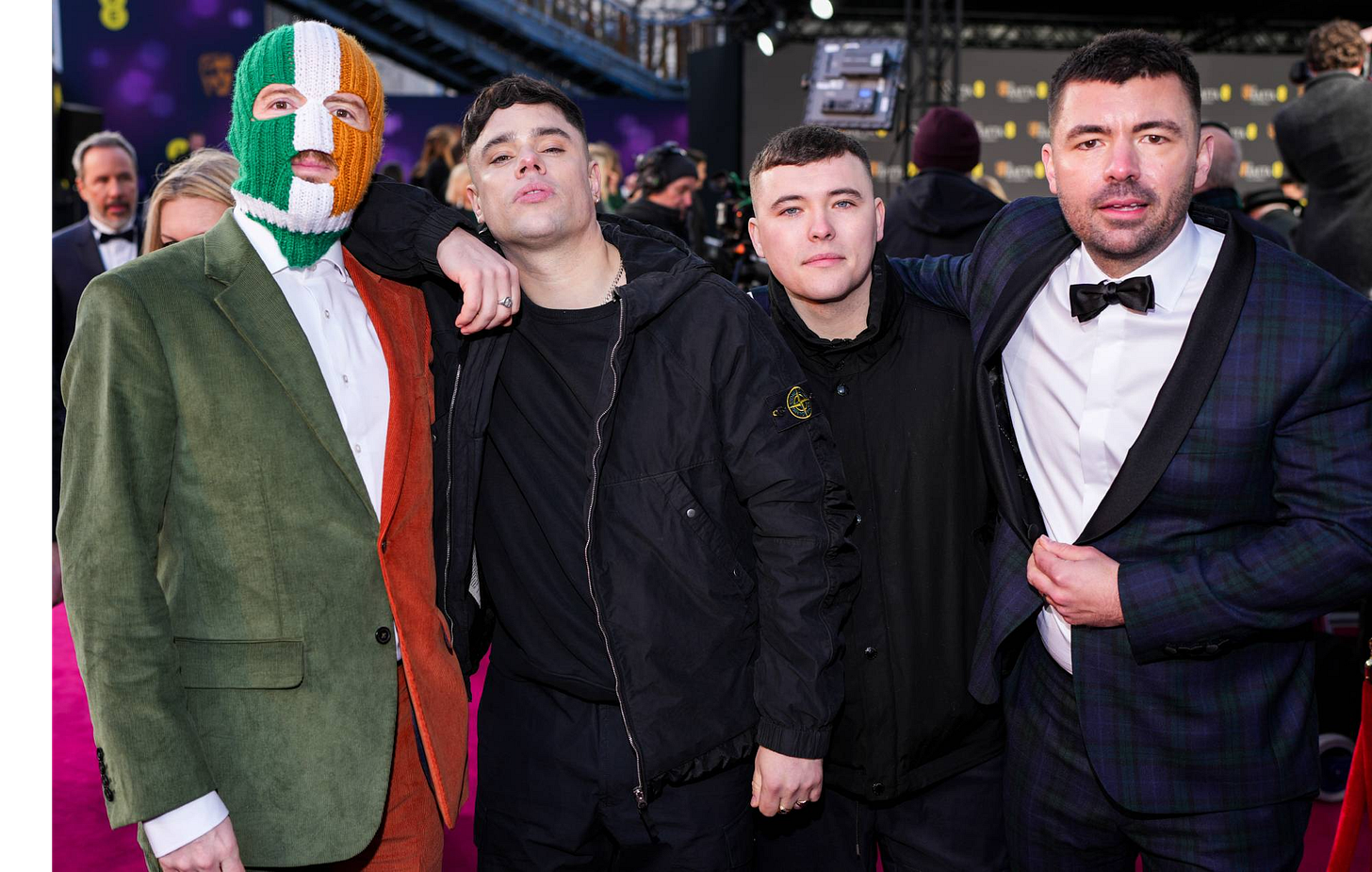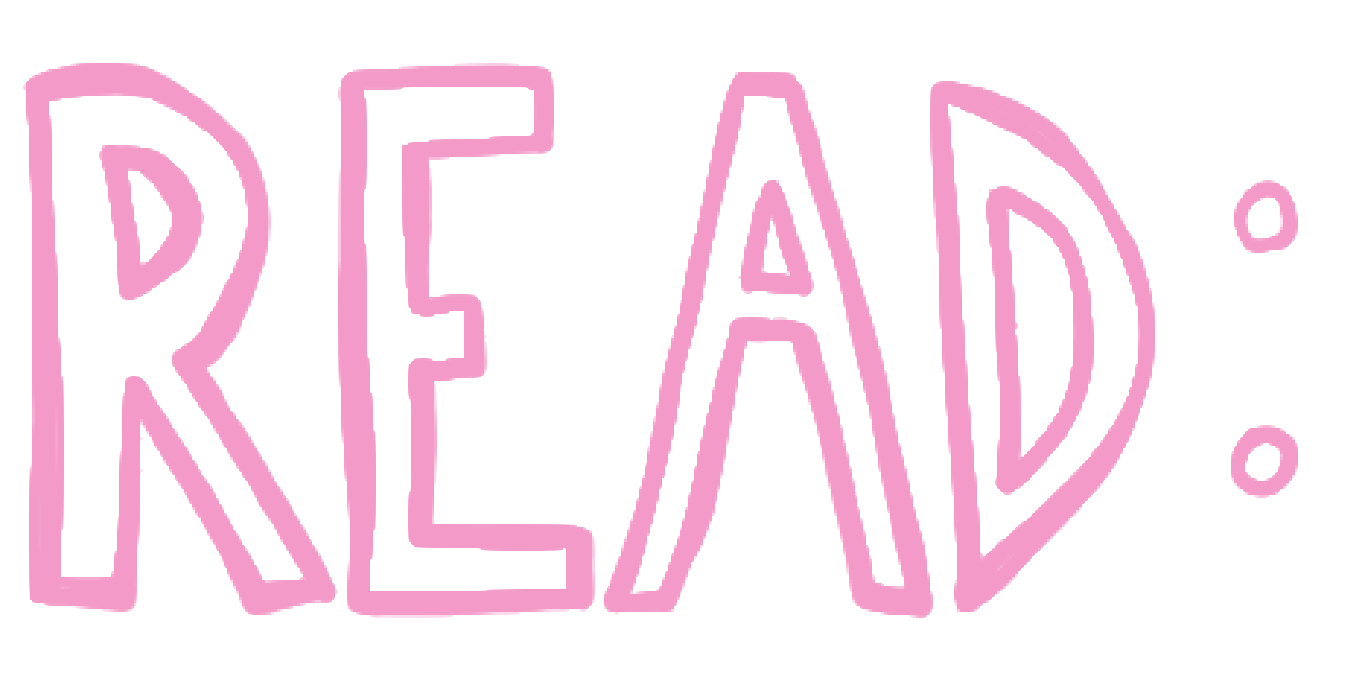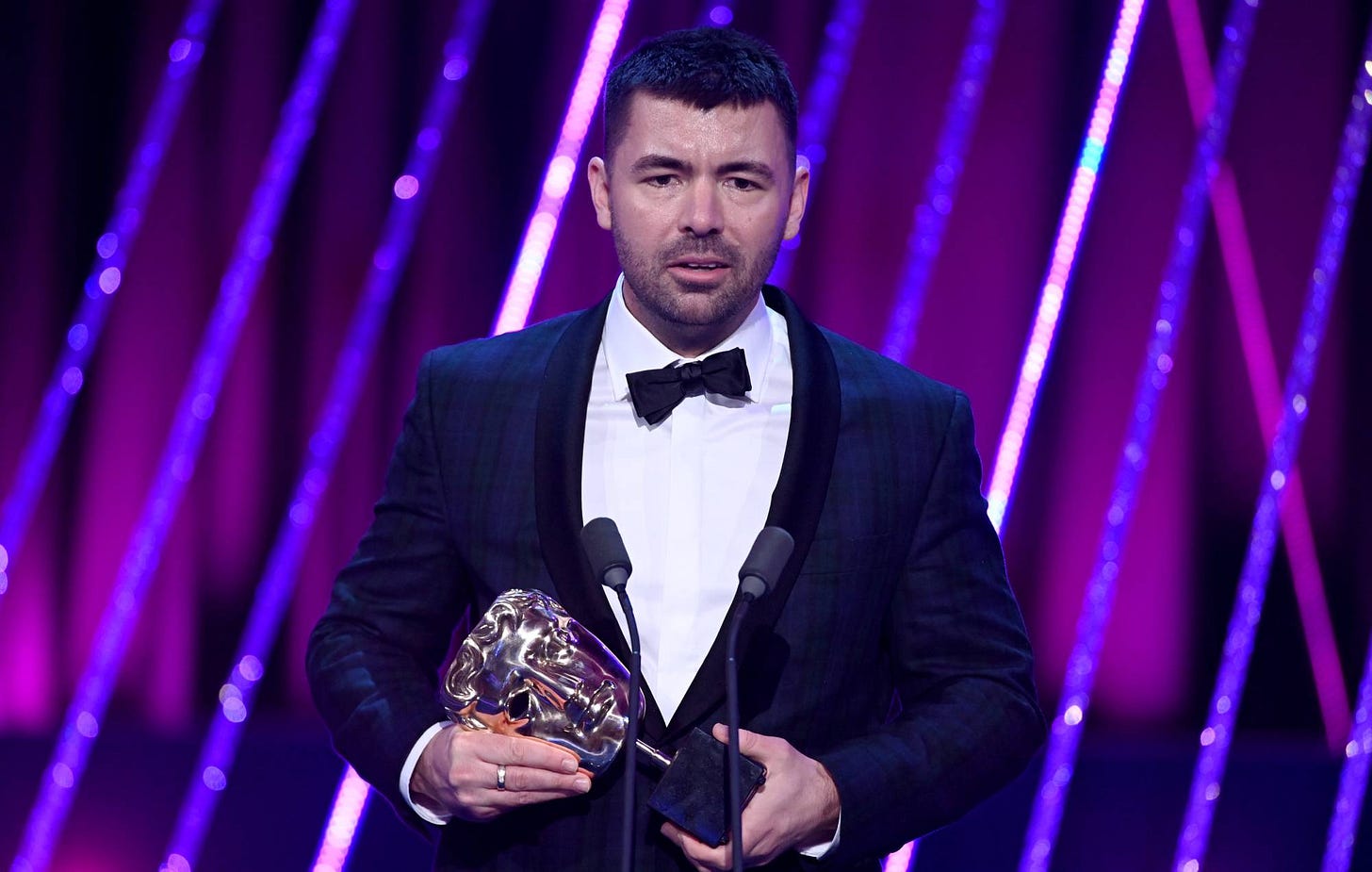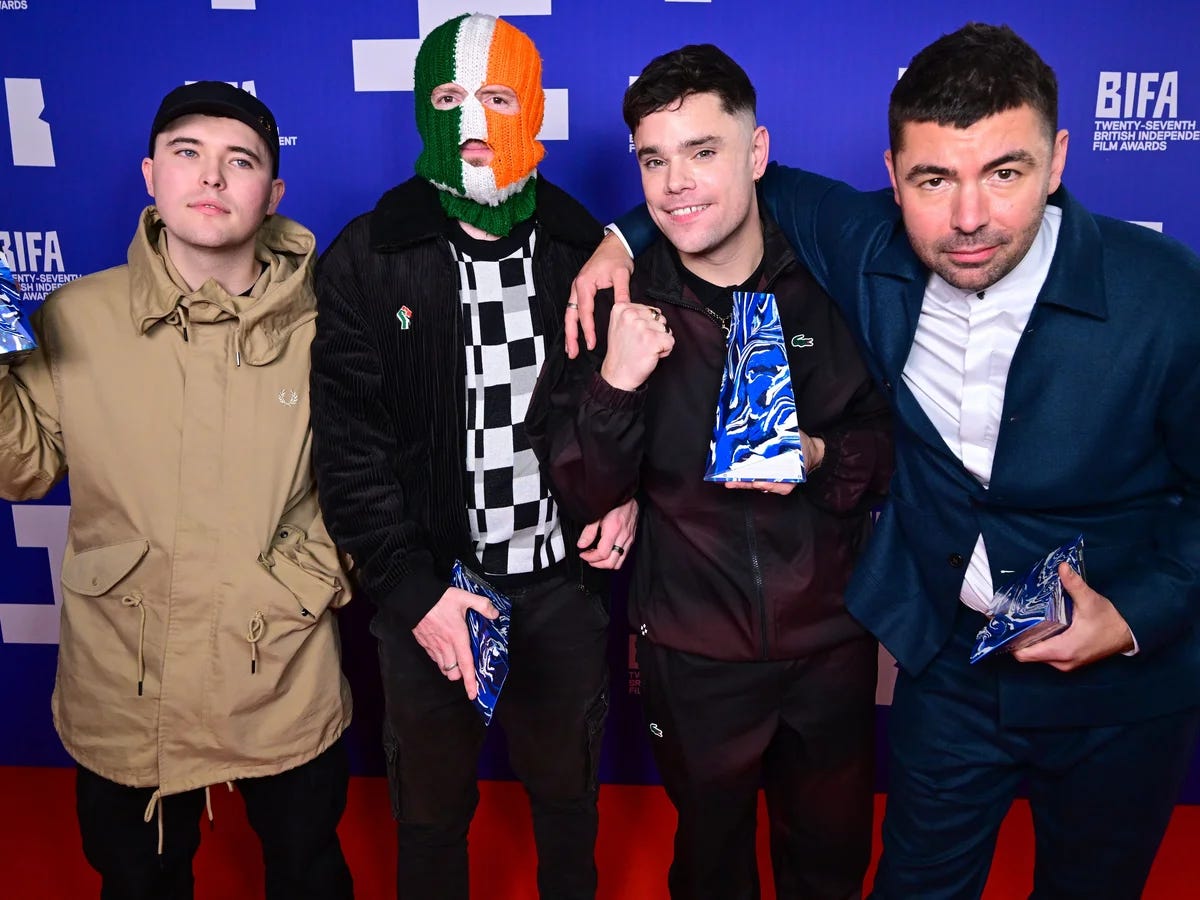Interview with Rich Peppiatt (Kneecap director)
Interview with Rich Peppiatt, the writer and director of Kneecap (2024 film) (for 95bFM)
“Once a language has died, it's gone forever. And what goes with it is a history of a people, a time, a place. And we are moving towards a world that is gonna be very, very homogeneous in the sense of English being dominant, and that's not a world where we're going to be enriched as people. It's kind of like the environment; once you've destroyed it, there's no getting it back. Language works in the same way.”
Lucia: I was wondering if you could tell the story of how the film kind of came to be?
Rich: Well, I live in Belfast, I kinda moved here about six years ago now. Within a couple of weeks of getting here, I walked into a bar where a local band were playing called Kneecap, and the rest is history. I was just—I was blown away by them. I thought they had an amazing stage presence, their music resonated with me. I didn't understand a bloody word that they were speaking, but there were 500 or so young people in the crowd rapping every word in Irish back to them. And so as much as I was interested in them as a performers, I was really intrigued by the fact that there was this young vibrant community of, as we call them, Irish language speakers living in an urban centre like Belfast. Because I kind of assumed the language was very rural, that it was kind of, you know, pretty much dead. And so that was kind of a revelation, and at the time, there was a sort of political fight going on to try and get official recognition of the Irish language in the North of Ireland. And, I thought there was a really interesting juxtaposition between what was happening on a political level, which was nothing really, it was kind of just a log jam, and this kinda underground movement that was developing of young people embracing the language, of which Kneecap were at the forefront.
I was intrigued by the idea of doing a biopic in real time. I feel like the biopic genre was something that had kind of been done to death. Was there a way of reinventing that genre by doing it rather than a band at the end of their career looking back, what was their way to do a biopic when a band's at the beginning of their career? What would that even be? To do a tri-protagonist film is very difficult, to have three main characters, and that was one of the things that the lads were insistent upon from the start, that no one could be the lead. Right? They all wanted to be the lead. And that posed a real problem for me because you sort of go out and go, “Right, well, let me try and watch all the tri-protagonist films that I can see to just see how it's done, just try and get a sense of how they're structured.” And then you realise there isn't really any, and you go, “Well, that's a bit ominous. Does that mean that's because people have tried and absolutely failed?” And, so, yeah, just to try and weave three narrative arcs together within a hundred-odd minutes.
L: You did such a good job of making the audience care equally about all of the protagonists, which, as you were saying, is a very hard thing to do, to not have one character kind of prevail.
R: I remember the fun we had when I turned up with a script that had Liam Óg doing the narration, and Naoise and J.J. were like, “Hang on. He can’t be the narrator. We wanna. Can we all be the narrators?” I was like, “Lads, it's not that easy. Like, you can't all be the narrators. One of you is gonna have to be a narrator, and it's Liam Óg because I’ve fucking decided.” *laughs*
L: I actually really loved the narration. It struck me quite a lot. Why was it that you decided to have it?
R: *laughing* I actually hate narration.
L: Really?
R: Yeah, it's something that, like it's a bugbear of mine. I think it's, on a kind of snobby level, I sometimes think that it's lazy. And, you know, if you take the idea that the best possible film you could make has no words. Right? Film is a visual medium. And so I spent a long time with the script working on it without any narration and was really resistant to the idea of narration until I got to the point it was like, “This is so complicated what you're trying to do.” Trying to, you know, cover all these grounds to do with the politics of the place, to do with their lives. There was just so much going on that eventually I went, “You know what? You're you're biting off your nose to spite your face here.” Like, this is a film, if ever there was one, that could do with some narration. Right? And so I accepted it, it was like, “Okay, right. Hold your nose. Have fun with it. Find a way to do the narration that kinda feels true to the style.” And, yeah, I can't imagine the film now without the narration, do you know what I mean? It it allows, stylistically an ability for us to jump around timelines and to sort of play with the form, and I don't think we could have done that without the narrative kind of voice over that that Liam Óg gives. There was a lot of trial and error on it to get it right.
But, you know, it was certainly — the film from start to finish was a labor of love, and I was very obsessive over the fact that there was not a single thing in this film that I was not going to make sure was 100% as good as I could make it, and and as creative and inventive and… It's very difficult to get the opportunity to make a narrative feature, asking people to give you millions of pounds of money. I'd made documentaries, I've made short films before, but I've worked for a long time to get the opportunity to make my feature. And I was like, “You know what? It doesn't really matter whether you succeed or fail, but if you're gonna fail, at least be able to fail on your own terms.” And so for me, I was gonna make this film exactly how I wanted it to be, and I could come to peace then with the idea that if it didn't work for audiences, then so be it. But at least I could sort of sleep easy in the fact that it was a film that was true to me.
L: I've always been really interested in the way that different highs are depicted on screen. I guess, like, from when I was a little kid and then now as an adult, it's obviously a different interest in it. But as opposed to, you know, some of them are, like, party scenes that you see in lots of films, and then you've made some pretty strong creative choices with some of the other drug scenes. Yeah, what like, obviously, “What inspires them?” I know that. *both laugh*
R: Well, yeah. I mean, I felt like, well me and the band, we definitely felt like, often drug scenes in films are a bit lazy.
L: The fisheye lens
R: Yeah. It just it's just a bit like, “Oh, okay, we've kinda seen it,” and “If we're gonna do drug scenes, they need to feel different.” And we basically went right, how can we depict — particularly ketamine was an interesting one because, it's not a drug that you see depicted on screen very often. And, so we were like: “Okay, let's try and work out how we can how we can play around with this.” And, yeah, you end up with sort of random claymation scenes. Weirdly, the claymation thing is is based on a cult nineties series in Ireland called Pulling the Devil by the Tail, you can see it on YouTube. And we were watching it one day, just at one of their houses, and we may well have done a bit of ketamine. And we were like, “This claymation, it is very ket-y.” It's like, claymation is a very ket-y sort of, I don't know, kind of form of of animation. We kinda got it in our heads that “Oh, it's it's quite a good depiction of ketamine in its own weird way.” And so, yeah, it ended up in the film and then playing the gig, you know, yet again, it's just just the weirdness of of, of a drug like Ketamine. It's just quite fun to try and depict on screen, I think.
L: Yeah, and I love the bus scene as well.
R: Oh, the bus scene! Well, the bus scene's another one, that was something that I had in my head for ages now, for years. I think that's from being, younger and going raving in London and those sort of, like, seven/eight in the morning, you'd be on the tube, heading home or heading to another party or something, and just how much of how public transport does not mix well when you're high. And it's just like that really stark lighting and everything like that. And I don't know. One day, I think I was tripping balls on the freaking tube in London, and I swear everyone was wearing the same stuff as the seats. And it was literally twenty years ago that happened, and it just stuck with me. It was like it was weird thing. Like, no way is everyone wearing the same stuff as the — anyway, it does make me laugh that, you know, some weird experience, high as a kite, when I was in my early twenties, has ended up in a movie twenty years later.
L: I think it said verbatim as well, drugs and public transport don't mix.
R: They don't mix! Yeah *laughs* There's a lesson for the kids out there.
L: I'm gonna give you space to talk about the importance of revitalization of language because that's a huge theme of the film and of Kneecap's work as well. And, well, you said that you had family in Auckland, so you you already know and understand the parallels that we have here in Aotearoa. Yeah, did you wanna talk a bit about the importance of language?
R: I mean, I think that the protection of indigenous language and culture is an issue which isn't probably given enough focus by people, particularly with language. You know? Once a language has died, it's gone forever. And what goes with it is a history of a people, a time, a place. And we are moving towards a world that is gonna be very, very homogeneous in the sense of English being dominant, and that's not a world where we're going to be enriched as people. It's kind of like the environment; once you've destroyed it, there's no getting it back. Language works in the same way. And so, we made a film that was very specific to a language battle that is happening in the North of Ireland. We didn't really have at the time a a sense of, you know, this film being about a broader global struggle. But we were, you know, once the film was made and we started sort of previewing it [we] realised that the battle that was happening in Belfast and in the North of Ireland was kind of being, played out across the globe. We realised that the film had the potential to tell a much bigger story and to find a bigger audience. And we're really happy that, you know, traveling around the world with the film, it seems to have resonated with people from all sorts of different backgrounds and cultures, who have found something at the heart of the film that touches them and then speaks to their own lived reality.









